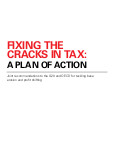 Campaigners of 34 organizations such as Christian Aid, ActionAid International, Oxfam, the Global Alliance for Tax Justice, Tax Justice Network have endorsed a briefing on the fight against tax dodging. In their statement from 31st August they forcefully warn the members of G20 countries' summit meeting in St. Petersburg on 5th and 6th September to declare reforms on the global tax system and make transnational corporations pay their fair share. Moreover the campaigners present concrete reform steps but insist on a participation of developing countries in negotiations.
Campaigners of 34 organizations such as Christian Aid, ActionAid International, Oxfam, the Global Alliance for Tax Justice, Tax Justice Network have endorsed a briefing on the fight against tax dodging. In their statement from 31st August they forcefully warn the members of G20 countries' summit meeting in St. Petersburg on 5th and 6th September to declare reforms on the global tax system and make transnational corporations pay their fair share. Moreover the campaigners present concrete reform steps but insist on a participation of developing countries in negotiations.
September 3, 2013 | Global Alliance for Tax Justice
G20 leaders urged to fight against tax dodging
Christian Aid, ActionAid International, Oxfam, the Global Alliance for Tax Justice, Tax Justice Network and others say governments' attempts to curb the epidemic of tax evasion and avoidance will only succeed if politicians stand up to lobbying by the powerful companies and individuals who benefit hugely from the status quo.
Their warning comes in a new briefing endorsed by 34 organisations and published in the run-up to G20 countries' summit meeting in St Petersburg on 5th and 6th September.
Alex Prats, Principal Economic Justice Adviser at Christian Aid, said: 'Almost every day, we get new evidence that aggressive tax avoidance and sometimes evasion are now the norm for large multinational companies, not the exception. They are making billions from these activities, while
ordinary people - especially in poor countries - pay the price in higher taxes and worse public services.
'G20 and other governments have around two years in which to prove whose side they are really on.'
The new briefing argues that governments should explore a range of possible ways to make multinationals pay their fair share. James Henry, Chair of the Global Alliance for Tax Justice, said: 'The G20 and other governments, as well as the OECD, should explore credible alternatives to the existing rules. At present, despite its good intentions, the OECD seems to be trying to save an international corporate tax system which is fundamentally flawed.'
In July, the OECD published an Action Plan on Base Erosion and Profit Shifting (BEPS) by multinational companies. [1]
Campaigners' new briefing encourages policymakers to pursue a rigorous study of the merits, risks and feasibility of alternatives to the OECD's existing rules, such as unitary taxation and formulary apportionment. [2]
In addition, it urges the OECD and G20 countries to do more to include poor countries in the BEPS discussions on making multinationals pay their fair share.
Maria Villanueva, policy advisor at Oxfam, said: Maria Villanueva, policy advisor at Oxfam, said: 'The people hardest hit by multinational tax dodging are poor people in developing countries. Developing countries can't compete with corporations' sophisticated methods of tax dodging and lose billions every year in potential revenues. This is a disaster for people living in poverty.
'The OECD and G20 countries should urgently ensure that developing nations are included as equal partners in the international search for solutions - not just asked to rubber-stamp plans agreed elsewhere. So far, with the exception of the BRICS, this has not happened.'
A third part of the briefing looks at what else governments must do, beyond the OECD BEPS Action Plan, to curb the financial secrecy which sustains tax evasion, corruption and money laundering across the world. Reforms such as automatically exchanging tax information between governments and greater transparency around the identities of the real owners of multinationals and what the companies do in each country where they work must become the norm.
Download the briefing "Fixing the cracks in tax: A plan of action" here.
[1] In February 2013, the OECD published a report called ‘Addressing Base Erosion and Profit Shifting’. The report looks at how multinationals avoid tax, what problems tax avoidance is causing for societies around the world and what governments might be able to do in response. The report begins: 'Base erosion constitutes a serious risk to tax revenues, tax sovereignty and tax fairness for OECD member countries and non-member countries alike.'
[2] Under unitary taxation, multinational companies would be taxed according to the economic substance of what they do and where they do it – for instance, where they have their factories, offices, staff and sales. Formulary apportionment is the use of a formula to allocate a multinational’s profits between the countries within it operates, before those countries tax their share of the profits.
